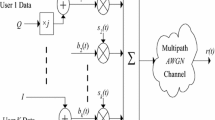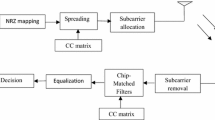Abstract
This paper proposes a new MIMO based CDMA code acquisition scheme. The pilot codes consist of a number of short Gold code sequences which are transmitted in parallel using a group of transmit antennas. Reception diversity is performed by multiple receive antennas at the receiver. Three different acquisition detection techniques are proposed and compared. Corresponding threshold optimizations are investigated as well. Detection and false alarm probabilities are derived in closed form based on the outputs of non-coherent matched filters. The acquisition performance is evaluated in terms of mean acquisition time (MAT) in Rayleigh fading environment. It is shown that the proposed MIMO acquisition scheme exhibits a much better MAT performance than the conventional single-antenna acquisition scheme. The results reveal that multiple receive antennas can be utilized to significantly reduce the MAT at the expense of receiver complexity increase. On the other hand, increasing the number of transmit antennas makes the MAT performance more robust in the presence of strong interference.
Similar content being viewed by others
References
Tarokh V., Seshadri N., Calderbank A. R. (1998) Space–time codes for high data rate wireless communication: Performance criterion and code construction. IEEE Transactions on Information Theory 44(2): 744–765
Alamouti S. M. (1998) A simple transmit diversity technique for wireless communications. IEEE Journal on Selected Areas in Communications 16: 1451–1458
Hammons R. Jr., El Gamal H. (2000) On the theory of space–time codes for PSK modulation. IEEE Transactions on Information Theory 46: 524–542
Gesbert D., Shafi M., Shiu D. (2003) From theory to practice: an overview of MIMO space–time coded wireless systems. IEEE Journal on Selected Areas in Communications 21(3): 281–302
Petre F., Leus G., Deneire L., Engels M., Moonen M., De Man H. (2003) Space–time block coding for single-carrier block transmission DS–CDMA downlink. IEEE Journal on Selected Areas in Communications 21(3): 350–361
Cances J. P., Mohammadkhani G. R., Meghdadi V. (2006) Turbo interference mitigation in layered space–time MIMO DS–CDMA uplink with TTCM (turbo trellis coded modulation). Wireless Personal Communications 37(1–2): 105–121
Yu J., Lee I. (2006) MIMO capon receiver and channel estimation for space–time coded CDMA systems. IEEE Transactions on Wireless Communications 5(11): 3023–3028
Fahmy Y. A., Mourad H. M., Al-Hussaini E. K. (2006) Multi-user MIMO mobile CDMA uplink system employing turbo coding and joint detection through a multipath Rayleigh fading channel. Wireless Personal Communications 38(3): 325–341
Jovanovic V. M. (1988) Analysis of strategies for serial-search spread-spectrum code acquisition—Direct approach. IEEE Transactions on Communications 36(11): 1208–1220
Su Y. T. (1988) Rapid code acquisition algorithms employing PN matched filters. IEEE Transactions on Communications 36: 724–733
Rick R. R., Milstein L. B. (1997) Parallel acquisition in mobile DS–CDMA systems. IEEE Transactions on Communications 45(11): 1466–1476
Rick R. R., Milstein L. B. (1997) Parallel acquisition of spread-spectrum signals with antenna diversity. IEEE Transactions on Communications 45(8): 903–905
Shin O., Lee K. B. (2003) Use of multiple antennas for DS–CDMA code acquisition. IEEE Transactions on Wireless Communications 2(3): 424–430
Kim S. (2004) Acquisition performance of CDMA systems with multiple antennas. IEEE Transactions on Vehicular Technology 53(5): 1341–1353
Won H., Shin O., Lee K. B. (2003) Acquisition for DS–CDMA systems with multiple antennas in frequency-selective fading channels. IEEE Transactions on Wireless Communications 2(4): 787–798
Zhang Y., Miller S. L. (2003) Code acquisition in transmit diversity DS–CDMA systems. IEEE Transactions on Communications 51(8): 1378–1388
Kwon Y., Kim K., Shin M., Lee C. (2004) An efficient code timing acquisition for MIMO CDMA system. IEEE 59th Vehicular Technology Conference 2: 819–823
Won, S., & Hanzo, L. (2006). Serial search based initial code acquisition in the multiple transmit/receive antenna aided multi-carrier DS–CDMA Downlink. In: 2006 IEEE ninth international symposium on spread spectrum techniques and applications (pp. 64–68).
Torrieri D. (2005) Principles of spread-spectrum communication systems. Springer, NY
Peterson R. L., Ziemer R. E., Borth D. E. (1995) Introduce to spread spectrum communications. Prentice Hall, Englewood Cliffs, NJ
Author information
Authors and Affiliations
Corresponding author
Rights and permissions
About this article
Cite this article
Liao, D., Qiu, D. & Elhakeem, A.K. Performance Analysis of MIMO Based CDMA Code Acquisition Over Rayleigh Fading Channels. Wireless Pers Commun 55, 457–473 (2010). https://doi.org/10.1007/s11277-009-9809-x
Received:
Accepted:
Published:
Issue Date:
DOI: https://doi.org/10.1007/s11277-009-9809-x





